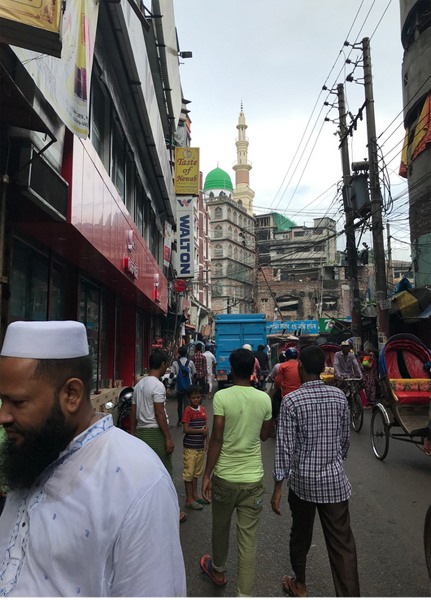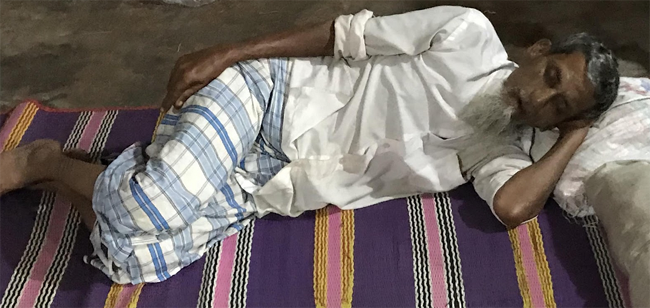The Unseen Reality of Life

Hi, I'm Rabiul. I recently got a position as an assistant teacher in a primary school at Kusumpur village near Munshiganj. Just outside the village, there is a large banyan tree. Every day, as I walked to school, I passed the tree and I saw a man wearing a torn shirt and a lungi, sitting in its shade. He was always speaking aloud, but I never saw anyone around for him to talk to. In fact, he seemed to be talking to himself. Though it seemed a little strange to me, and I passed him every day, I never stopped to talk to him either.
Over the last few days, I hadn’t seen him. The place where he usually sat was empty; no one was sitting there any longer. I was feeling little curious about this, so I asked the owner of a nearby tea-stall about the man who usually sat under the tree. The owner of the tea-stall knew who he was, and gave me his address. Following the directions I had been given, I found my way to the man’s house.

Another man was sitting outside. I did not know his name, so I addressed him as “O bhai”. As I spoke, a young woman who was inside the house heard my voice and came outside towards me. “Who do you want?”, she asked. I asked her about the man I had seen under the tree. “I wondered if he was ill” I said, “I haven’t seen him for a few days.” “He was my father.” She said, in a very matter-of-fact voice. “He died the day before yesterday”.
I noticed that there was no sign of sadness on her face over the fact that her father had passed away. To be honest, I was a little surprised to see that. I expressed my sympathy to her, as is expected in this situation, but she still did not seem very sad. As I was curious, and wanted to know what had happened to him, I asked her how it was that he had died. Little by little, she began to tell me his sad story.
She said that, four or five days earlier, some boys from the village had shouted cruel words at her father, and beaten him. Their cruel words and actions had broken both his body and spirit, and he hadn’t been able to get over the shock of the event. I told the young woman how I had seen her father every day, and how he was always talking, even though no-one was with him. I gently asked her further, “Was your father suffering mentally for any reason?” A shadow passed over the young woman’s face. It was then that she told me he had indeed been mentally ill. In fact, he had been struggling with a heavy weight of grief for some time. Then she shared her father’s story more fully.
Her father’s name was Eyakub Sarker. At one time, he had been an Imam and had led the prayers at the local mosque. Their family had been well-respected in those days, and were quite well-off. At that time, there were five family members: two boys who had married, one girl (herself), and their parents. She told me they had been a very happy family.

One day her father had found out that his oldest son had joined an extreme political group. At first, he had put pressure on his son to leave the group, but he failed! His son just would not listen to him. Gradually, the young man began selling drugs, smuggling and started taking part in many other bad activities, trying to get money for the group he had joined. His father could see everything that was happening, but as much as he tried, he simply couldn’t control his son.
Then, one day, about two years ago, his son was found dead. He had been shot in the crossfire when someone had pulled out a gun in a disagreement between members of his group. Immediately after that had happened, the younger son also went missing and everyone believed he had also been killed. The younger son’s wife could not accept what had taken place, and she too died, a year later.
As she spoke to me, the woman explained that, because of all these sad events, the people in their village thought he was bringing bad luck to the village. They had begun to blame her father for the three deaths and all the trouble and they had begun to make life very hard for him. After some time, he was forced to give up being an Imam, and leave his work that he had once loved so much. They criticised him for not being a good father, and said he was no longer the right person to lead them. With no work of value to do any longer, he spent his days sitting under the tree, praying and reciting texts from the holy book.
Over time, because he stayed under the tree all day, and seemed to be speaking to no-one, people began to say he was mad. The young woman told me she believed that is why, few days ago, when the boys of the village had said such cruel things, and beaten him, he could no longer put up with the cruelty. She said she believed he had died of a broken heart. But even so, she herself, did not show any signs of real sadness at her father’s death. I wondered if she also blamed him for all the bad fortune that had happened to her family.

I said, “Thank you” to her for taking the time to tell me all that had happened, and then I left her. My own heart felt heavy with sadness. Even though I had not known the man personally, he had been a familiar part of my daily life. It was sad to think that someone who had once been so well-loved could have ended up this way.
As I thought about his story, I thought perhaps this is a realistic picture of our cruel society. But who can we really blame for such a reality: is it society as a whole, or the individual people in it, who are really responsible for such events? I wondered, how do we really think about the people who are living beside us every day? People who may be struggling with a heavy sadness that we cannot understand. Should we try to be of help to them? What can we do? Truly, these are questions to ponder! What do you think, dear reader?
______________________________________________________________
Learning Activities
Vocabulary Lists:
Learn all of the words you do not already know from the first two lists below.
-
High Frequency words from the 2nd 1000 General Service Word List
| aloud | empty | honest | parents | shirt | weight |
| beaten | extreme | immediate | prayers / praying | shock | |
| blame / blamed | gradually | inside | responsible | shouted | |
| cruel / cruelty | gun | luck | sad / sadness | sympathy | |
| curious | holy | mad | shade | thank |
2. High Frequency Words from the Academic Word List
| assistant | individual | mentally | primary | texts |
3. Do you know the meaning of the words and expressions below? They are not high frequency, or common, words in English, so only learn these words if you already know all of the word in the two lists above, very well.
| criticised | crossfire | drugs | extremist | grief |
| ponder | reciting | smuggling | tea-stall |
4. Comprehension Questions
-
How did the writer of this story respond to the man under the tree as she passed him each day?
-
How did the writer find her way to the man’s house?
-
Why did the young woman come out of the house to speak to the writer? (That is, how did she know the writer was there?)
-
What does “a shadow passed over the young woman’s face” mean?
-
What does “shot in the crossfire” mean?
-
Explain the meaning of ‘blame’ and ‘criticise’. How are these words different in meaning?
-
Explain the meaning of the phrase “to put up with” something.
5. Critical Thinking Questions
These questions require learners to use Higher Order Thinking Skills (HOTS). The skills of analysing, applying, evaluating and creating are based on Bloom’s Revised Taxonomy of Cognitive Objectives. (See…https://tlc.iitm.ac.in/PDF/Blooms%20Tax.pdf ).
These kinds of questions are useful for small group or pair discussions, when you want learners to think more deeply about the ideas in the reading, as they go beyond comprehension and recall only. If time is limited, tell your learners to choose one or two of the questions they find most interesting, and discuss only those.
Alternatively, the questions could be used as ideas for writing. If you use these ideas for a writing task, make sure your learners have the chance to exchange their writing with each other and to talk with, and ask questions of their partners about the opinions they have expressed. The exchange of ideas will enrich their understanding, and expose them to a wider range of ideas.
1. Analysing: Give some reasons, in English, as to why you think the writer did not stop to speak to the man, though she passed him every day.
2. Evaluating: What do you think of the fact that the writer went to the man’s house to find out what had happened to him, even though she had never spoken to him before that day? In those circumstances, do you think it was a strange thing to do or not? Give reasons, in English, for your answers.
3. Evaluating: Do you think it is a good idea to get involved in the lives of strangers? In what kinds of circumstances do you think it is a good thing? In what circumstances do you think it might be a bad or foolish thing to do? Give reasons, in English, to support your point of view.
4. Applying: Read the last paragraph again. In English, answer each of the questions the writer has asked, giving your own point of view, with reasons for it. Use your knowledge and/or experience of real life situations to help you explain your ideas in English.
5. Creating: Imagine you were a teacher in the village that the writer describes in her story. What could you do to encourage the people in your village to support each other more? Design a community activity that will help people in your village to build better relationships with each other. Think about who will take part, where you will hold the activity, what kind of people you need to help you organise the activity. Think, also, about the resources you need, and from where to get them.
What exactly will people do during the activity? Make written notes of your ideas in English, then design a poster (also in English) to advertise your activity to the people in your village. Think also about how you will evaluate the effectiveness of your activity after it is completed. Have a poster exhibition day with everyone in your class. Show your poster and explain your ideas fully, in English!